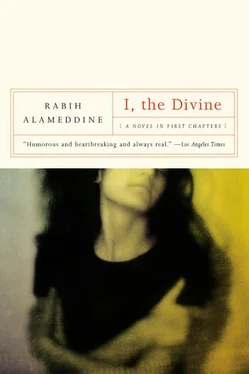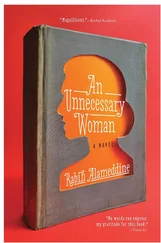When my lover, David, saw her picture the first time he arrived at my house, he wondered aloud why I had it. He considered her a wayward slut and a megalomaniac. Having already fallen for him, I forgave his impertinence, giving him credit for being the first heterosexual man I knew, other than my grandfather (whom I had always wondered about in any case), who had even heard of her.
I was unable to find out which picture of Bernhardt Freud had hanging in his office. I had two, a photograph and a poster. The photograph was circa 1880 with Sarah as Dumas’s La Dame aux Camélias, the role which made her famous, on a settee, looking despondent, away from the intrusive camera, wearing what appears to be a nightgown and a feather-trimmed robe de chambre. The poster was for the 1898 production of Medea, with Sarah holding a bloody knife, the supine body of a young boy at her feet.

Count Leo Nikolayevitch Tolstoy lied. I do not know if all happy families resemble each other as I do not know any content families. In Lebanon during the war, however, all unhappy families were not unhappy in their own way. They suffered because at least one family member was killed. It did not matter why a family was unhappy before; death became the overpowering reason.
For our family, it was the death of Rana.
Rana was my half-sister, my stepmother’s eldest. She was born in May 1964 and died on July 7, 1978.
I was her closest sister. Early on, she spied on me, mimicked my every gesture. I was four years older, which also meant she wore my hand-me-downs. When I walked with friends, she used to follow me, always pacing herself about ten steps behind us, not exactly a part of our group, but any passerby would recognize she was with us. She watched every soccer game I played in, always cheering on the sideline like an English supporter.
My eldest sister, Amal, and I called her Beesy , a diminutive of “pussycat” in Lebanese. When Rana was eight, a neighbor had a fight with my stepmother. Rana went to the neighbor’s door two floors below us, pulled down her underwear, crouched, and peed on the neighbor’s welcome mat, something that I would have been proud to have done at her age. She told only Amal and me about it. The neighbor complained about stray cats that came into the building.
Rana was beautiful, taking after our paternal grandmother. Our grandmother’s sour disposition rendered her unattractive. Rana, on the other hand, was sunshine incarnate. She had shimmering black hair, light skin, large hazel eyes, and full lips, more a Botticelli than a da Vinci. By the time she reached fourteen, her beauty had become a general topic of conversation. My stepmother forced her to pin a small turquoise stone inside everything she wore to keep away the evil eye. It did not work.
The year 1978 was horrific. The civil war raged on. The Syrians wanted to become the major players in Lebanon, their army spread all over the country. Palestinians ran amok in Beirut. Eleven PLO fighters landed on Israeli shores and their carjacked vehicles ended up in Tel Aviv, killing Israeli civilians. In response, Israel invaded Lebanon, killing hundreds of Lebanese civilians. Instead of fighting the Israelis, the Syrians turned their guns on the Christians of East Beirut, killing hundreds of Lebanese civilians.
On July 1, 1978, the Syrians began an intensive bombing campaign against East Beirut, and a seventeen-year-old Syrian soldier, by the name of Izzat Ghalaini, laid his eyes on Rana. She was walking from our home to Amal’s, what was once our grandfather’s apartment, two buildings down. He cracked a joke as she passed by. She laughed, an innocuous laugh that would prove to be ominous. The pimply-faced soldier was besotted. He had misinterpreted. My sister’s laugh never meant very much. She laughed easily, constantly, nothing could remove the joy in her eyes.
She arrived at Amal’s house, told the story of the homely soldier to Amal and her husband, told it as something amusing that happened on her way over. On her return home, the soldier was waiting for her with a single daisy. She crossed the street to avoid him.
On July 2, the Syrians intensified their bombing of the Christians. In West Beirut, we had no water, electricity, or phones. It was worse in East Beirut. They could not even rescue the wounded from damaged buildings. We stayed indoors the whole day.
On July 3, Rana and I walked over to Amal’s, holding the hands of our youngest sister, Majida. The soldier ran over to us. “I’ve been hoping you’d show up,” he said.
“What the hell for?” I asked.
He retreated a step, his face registered shock. “My intentions are completely honorable,” he said softly, hesitantly.
“I don’t give a damn,” I replied. I pulled my sisters along and left him standing bewildered. “Don’t you have work to do?” I yelled back. “Like manning some checkpoint or shooting at people instead of lurking about and harassing decent girls?”
On July 4, Kameel Chamoun, a Christian leader and former Lebanese president, called for the withdrawal of Syrians from Lebanese soil. Prime Minister Hoss, a Muslim, rejected that demand. The Syrians kept shelling.
On July 5, the soldier showed up at our door in army fatigues, his rifle slung across his shoulder. He politely asked to speak to our father. When my stepmother, who had answered the door, asked him what for, he said that there had been some misunderstanding. He had come to ensure that our family understood that his intentions were honorable and that had his mother not been so far away, she would have arrived with him to our door. He intended to ask for my sister’s hand in marriage. My stepmother inadvertently laughed. She then realized he was serious. She told him in no uncertain terms that Rana was much too young, that the family had many pressing things to worry about, not the least of which was an internecine war, and in any case, she was not sure he would be a very appropriate husband for her daughter.
On July 6, the Lebanese president, Elias Sarkis, threatened to resign, saying that the Syrians were carrying out operations without his consent or cooperation. Israeli planes began flying low over Beirut, their sonic booms rattling windows, their presence warning the Syrians off further bloodshed.
The Syrians heeded the warnings. They stopped shelling on July 7, after over four hundred Lebanese Christian civilians had been killed. Rana, celebrating the relative calm, walked out of the house to visit a school friend. The soldier did not approach. He shot her from across the street. She died instantly. He placed the butt of his rifle on the ground, put the other end in his mouth, and fired.
My stepmother cried on hearing the news. My father did not. My stepmother watched my father and dried her tears. She wanted to appear strong. At the burial the following day, even with the coffin in the room, she sat regally in her chair, her eyes moist but not flowing. The wailers, whose main purpose was to ensure that every female family member cried enough, failed.
The official condolences, on July 9, occurred at Dar el-Taifeh, the main Druze building in the city. Our house could not hold the number of people that showed up. My stepmother, my father’s daughters from his first marriage — Amal, Lamia, and I — and my half-sister Majida, sat in one of the large halls. Around us were our aunts, cousins, and other relatives. In the other room, which we could barely see because of the size of the halls, sat the men. My father insisted that my half-brother, Ramzi, all of eight-years-old, stay with him. Men and women entered both halls, offered their condolences and then split up. Every time someone came in, we stood up. We spent the entire morning on our feet.
Читать дальше













